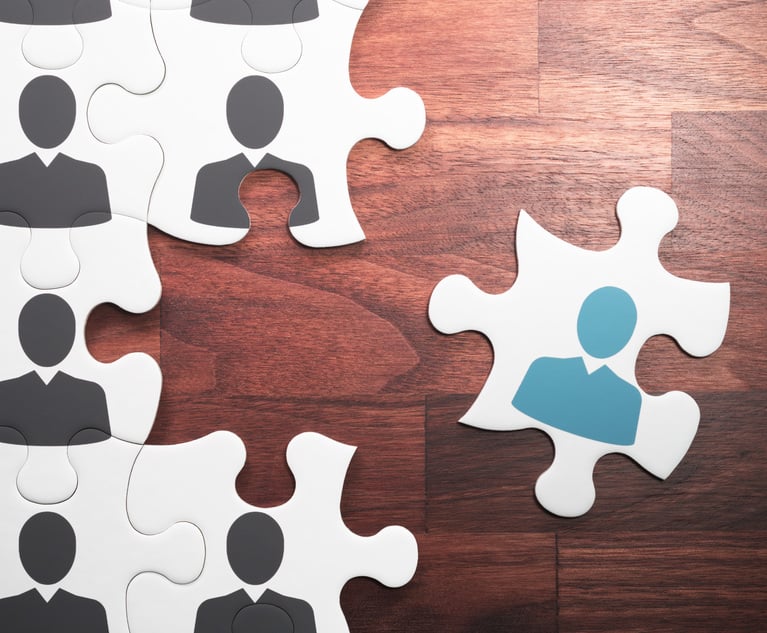 Robin Belleau, Kirkland & Ellis. (Courtesy photo)
Robin Belleau, Kirkland & Ellis. (Courtesy photo)Kirkland Hires Lawyer Turned Therapist to Lead New Wellness Effort
"People come to us when they're in need, so it's very difficult for a lawyer then to say, 'I actually need help,'"
May 29, 2019 at 03:18 PM
6 minute read
The original version of this story was published on The American Lawyer
A growing number of large law firms have rolled out initiatives aimed at improving mental health and wellness. When it comes to firms that have hired or redirected a full-time staff member to lead the effort, the list gets shorter.
One deterrent is likely the burden of another hefty salary for a non-fee-earner. But if any firm can shoulder the expense, it's Kirkland & Ellis, which announced on Wednesday that it is hiring attorney and licensed clinical professional counsellor Robin Belleau to oversee a new wellness programme.
Belleau, Kirkland's Chicago-based firm-wide director of wellbeing, worked as a lawyer for eight years before she returned to school to become a therapist. She was previously executive director of the Lawyers' Assistance Program in Illinois.
She spoke to The American Lawyer about her background and her aims for the position. This interview has been condensed and edited for clarity.
What prompted you to make the move into becoming a therapist?
I was working at that time as a public defender, and when you're working in litigation, there's a lot of stress in the adversarial process, a lot of fighting back and forth.
I didn't so much enjoy that, but I took a look at what I did enjoy about my position. I was a juvenile public defender. Anytime we entered the courtroom, there was always a slew of therapists with us, working with our clients, and I really gravitated to what they were doing. I was working on behalf of my client and so were they, and what drew me to their jobs was that they got to work with the clients more long term. When I would see someone, it would be because they got in trouble, for a couple of times in court. I felt like the therapists could make a real change in their clients' lives.
The criminal law world is a little different from a place like Kirkland. Do you have particular experience navigating the Big Law world as well?
As the executive director of the Illinois Lawyers' Assistance Program, we assisted clients from every walk of life, and we saw many Big Law lawyers there as well. Even though there is something a little different about being a solo practitioner or working for the government, we all went to law school together, we all passed the same bar, we really all think the same way. Navigating Big Law is not much different.
From your perspective, what are the biggest challenges a firm like Kirkland faces when it comes to promoting mental health and wellness among attorneys and staff?
I think the level of stress that comes along with practising law, being in an adversarial position throughout the day, it really creates a negative mindset, which can affect your mental health and physical health. Oftentimes people aren't necessarily aware of that and they let it bleed over into their personal lives and into the rest of their day. I think that the adversarial nature of the law that creates that stress, anxiety and depression that is the biggest roadblock to achieving mental wellbeing.
For lawyers in particular, do you find there is a stigma attached to seeking help?
Absolutely. Lawyers see themselves as the problem-solvers of society. People come to us when they're in need, so it's very difficult for a lawyer then to say, "I actually need help", because: "What is my client going to think, what is my colleague going to think, what is the judge going to think of my taking time off to get help?"
So, many lawyers don't ask for help.
How do you ensure that your work doesn't go for naught and that lawyers take advantage of the programmes you're going to make available?
Starting the conversation and continuing the conversation.
We are the problem-solvers of society, but we're absolutely not perfect, we can ask for help. Asking for help in terms of stress, anxiety, depression, substance abuse: it absolutely will improve your mental wellbeing, it will improve your physical health, it will improve your life at home and life at work. I think people who have good mental health are much more productive.
Are there any particular initiatives that you're anticipating putting forward?
Very soon we're going to be announcing the launch of two apps that we're going to be offering our Kirkland staff and lawyers, which focus on mental wellbeing and also adaptive behaviours and how to make better choices.
This summer and this fall, we're going to be launching a continuing legal education presentation as one of the core components of the programme, resiliency, and it's called Strength Under Stress.
The focus of the programme is to define resiliency, talk about why it's important to lawyers and the people who work with them, how to manage your stress and develop healthy coping skills.
We are also going to be launching a presentation with regards to how to recognise signs and symptoms of mental health issues, substance misuse issues in your colleagues, your friends and even yourself. More importantly: what to do, how to have that conversation with the person, what your next steps are, and how to connect that person to resources.
Kirkland is a firm that draws significant attention from the media and the wider legal community. Do you have the expectation that your efforts will resonate beyond the firm?
I'm hoping that other firms take a look at what we're doing here and say: "You know what, we need to be doing that, we need to step up for our staff and our attorneys as well, and we need to be promoting wellbeing and providing people with the connections and resources in order to achieve it."
|Read More
Minds Over Matters: An Examination of Mental Health in the Legal Profession
This content has been archived. It is available through our partners, LexisNexis® and Bloomberg Law.
To view this content, please continue to their sites.
Not a Lexis Subscriber?
Subscribe Now
Not a Bloomberg Law Subscriber?
Subscribe Now
NOT FOR REPRINT
© 2024 ALM Global, LLC, All Rights Reserved. Request academic re-use from www.copyright.com. All other uses, submit a request to [email protected]. For more information visit Asset & Logo Licensing.
You Might Like
View All


Pogust Goodhead Set to Axe Roles as Accounts Remain Overdue

Trending Stories
Who Got The Work
Michael G. Bongiorno, Andrew Scott Dulberg and Elizabeth E. Driscoll from Wilmer Cutler Pickering Hale and Dorr have stepped in to represent Symbotic Inc., an A.I.-enabled technology platform that focuses on increasing supply chain efficiency, and other defendants in a pending shareholder derivative lawsuit. The case, filed Oct. 2 in Massachusetts District Court by the Brown Law Firm on behalf of Stephen Austen, accuses certain officers and directors of misleading investors in regard to Symbotic's potential for margin growth by failing to disclose that the company was not equipped to timely deploy its systems or manage expenses through project delays. The case, assigned to U.S. District Judge Nathaniel M. Gorton, is 1:24-cv-12522, Austen v. Cohen et al.
Who Got The Work
Edmund Polubinski and Marie Killmond of Davis Polk & Wardwell have entered appearances for data platform software development company MongoDB and other defendants in a pending shareholder derivative lawsuit. The action, filed Oct. 7 in New York Southern District Court by the Brown Law Firm, accuses the company's directors and/or officers of falsely expressing confidence in the company’s restructuring of its sales incentive plan and downplaying the severity of decreases in its upfront commitments. The case is 1:24-cv-07594, Roy v. Ittycheria et al.
Who Got The Work
Amy O. Bruchs and Kurt F. Ellison of Michael Best & Friedrich have entered appearances for Epic Systems Corp. in a pending employment discrimination lawsuit. The suit was filed Sept. 7 in Wisconsin Western District Court by Levine Eisberner LLC and Siri & Glimstad on behalf of a project manager who claims that he was wrongfully terminated after applying for a religious exemption to the defendant's COVID-19 vaccine mandate. The case, assigned to U.S. Magistrate Judge Anita Marie Boor, is 3:24-cv-00630, Secker, Nathan v. Epic Systems Corporation.
Who Got The Work
David X. Sullivan, Thomas J. Finn and Gregory A. Hall from McCarter & English have entered appearances for Sunrun Installation Services in a pending civil rights lawsuit. The complaint was filed Sept. 4 in Connecticut District Court by attorney Robert M. Berke on behalf of former employee George Edward Steins, who was arrested and charged with employing an unregistered home improvement salesperson. The complaint alleges that had Sunrun informed the Connecticut Department of Consumer Protection that the plaintiff's employment had ended in 2017 and that he no longer held Sunrun's home improvement contractor license, he would not have been hit with charges, which were dismissed in May 2024. The case, assigned to U.S. District Judge Jeffrey A. Meyer, is 3:24-cv-01423, Steins v. Sunrun, Inc. et al.
Who Got The Work
Greenberg Traurig shareholder Joshua L. Raskin has entered an appearance for boohoo.com UK Ltd. in a pending patent infringement lawsuit. The suit, filed Sept. 3 in Texas Eastern District Court by Rozier Hardt McDonough on behalf of Alto Dynamics, asserts five patents related to an online shopping platform. The case, assigned to U.S. District Judge Rodney Gilstrap, is 2:24-cv-00719, Alto Dynamics, LLC v. boohoo.com UK Limited.
Featured Firms
Law Offices of Gary Martin Hays & Associates, P.C.
(470) 294-1674
Law Offices of Mark E. Salomone
(857) 444-6468
Smith & Hassler
(713) 739-1250









